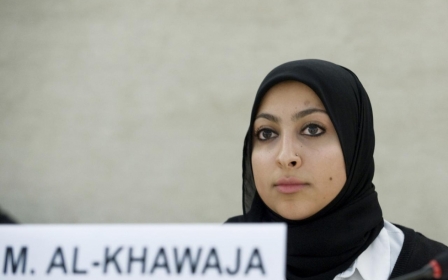Rights groups 'cautiously optimistic' after Bahrain release rights activist

Bahrain released human rights activist Maryam al-Khawaja on Thursday, although the charges against her still stand and she has been placed on a travel ban.
“In accordance with an order from the high criminal court, Maryam Abdulhadi al-Khawaja was released dependent on a guarantee of her place of residence and a travel ban was imposed on her,” read a Bahraini interior ministry statement.
“The lawyer of the accused requested her release after she was arrested on charges of assaulting a female officer and a policewoman at the Bahrain International Airport on 30 August.”
Khawaja, a dual Bahraini-Danish citizen, flew into Manama at the end of August with the intention of visiting her jailed father Abdulhadi al-Khawaja. He is currently on hunger strike in protest at his life imprisonment for “organising and managing a terrorist organisation,” charges he maintains were politically motivated due to his participation in mass protests against the al-Khalifa monarchy.
Maryam al-Khawaja is due to appear in court on 1 October to answer the charges against her. She denies the accusations and has made separate allegations that police officers assaulted her at the airport on 30 August.
“As soon as I sat down that police officer [who had asked her to sit] with three other policewomen attacked me. One policewoman put her knee in my stomach, another twisted my arm behind my back. My only reaction was to hold onto my phone,” she said to her sister during a prison visit earlier this month.
More than 150 organisations have called for the release of Maryam al-Khawaja and many of them expressed “cautious optimism” over her release on Thursday.
“Maryam’s release is a positive step but we remain troubled that the government has not dropped the unfounded charges against her,” said Sayed Ahmed Alwadaie, advocacy director at the UK-based Bahrain Institute for Rights and Development.
“We fear that she will, like so many other released detainees caught in Bahrain’s unjust legal system, live under the constant fear of re-arrest.”
Co-signatories to the statement, the US-based Americans for Democracy and Human Rights in Bahrain, praised the international support they said contributed to Khawaja's release.
"We are very pleased with Maryam’s release and sincerely thank the Office of the High Commission for Human Rights for its coordination on the matter,” said Husain Abdulla, ADHRB’s Executive Director. “We also thank the United Nations missions who expressed concern over the human rights situation in Bahrain, including the detention of the al-Khawajas, during the 27th Session of the Human Rights Council, including Ireland, Norway and Denmark.”
Nabeel Rajab, co-founder of the Bahrain Centre for Human Rights, expressed concern for the health of Khawaja’s father Abdulhadi in his statement.
“While I am overjoyed for Maryam I remain concerned over the condition of my friend Abdulhadi,” said Rajab. “The government may have responded to international pressure in Maryam’s case but officials still refuse to release Abdulhadi, Ibrahim Sharif, Naji Fateel and many other prisoners of conscience from arbitrary imprisonment.”
Activists said there are more than 3,000 political prisoners in Bahrain, although authorities dispute this number. The tiny Gulf State has been in the grip of an uprising since hundreds of thousands of people, mostly members of the majority Shiite community, took to the streets in February 2011.
Three days after demonstrations began government forces broke up protests camps with teargas, birdshot and batons that left at least two dead and hundreds injured.
Since then activists say around 100 protesters have died in the unrest, although the government disputes these figures and says at least 14 police officers have been killed in attacks on their forces. A national dialogue process between opposition representatives and the government has been stalled since January due to sharp differences of opinion over the uprising and a failure to agree on a format and agenda for the talks.
Middle East Eye propose une couverture et une analyse indépendantes et incomparables du Moyen-Orient, de l’Afrique du Nord et d’autres régions du monde. Pour en savoir plus sur la reprise de ce contenu et les frais qui s’appliquent, veuillez remplir ce formulaire [en anglais]. Pour en savoir plus sur MEE, cliquez ici [en anglais].





